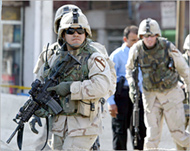Duelfer report: Political ammunition
The recent disclosure by the Bush administration’s own investigative team that Saddam Hussein had not possessed weapons of mass destruction for more than a decade, shattered the US president’s principal justification for invading Iraq.

But political analysts say whether such revelations will alter the course of the hotly contested presidential race, depends on Democratic presidential candidate John Kerry’s ability to convince voters that the report confirms Iraq never presented an imminent threat to US national security.
“It can’t help Bush, but whether it will hurt him dramatically depends on whether the Democrats can make the public understand just how little basis there was, in retrospect, for fearing Saddam Hussein at the start of the war,” Gideon Rose, managing editor of Foreign Affairs magazine, said.
While most analysts in Washington view the report as a political blow to the administration, its impact on the election will likely be defined by other events in Iraq over the next several weeks, according to Norman Ornstein, a resident scholar at the American Enterprise Institute, a conservative thinktank.
Big burden
“If we get a continuing cascade of bad news out of Iraq, it will be one of a number of contributing factors making it a big burden for Bush,” Ornstein said.
The findings, presented by Charles Duelfer, the chief US weapons inspector in Iraq, said whatever chemical and biological weapons Saddam possessed were destroyed after the first Gulf War and that years of international sanctions had crippled his attempts to develop nuclear technology.
 |
|
Bad news out of Iraq could yet |
“I still do not expect that militarily significant WMD stockpiles are cached in Iraq,” Duelfer said recently in testimony before the Senate Armed Services Committee.
Unlike many partisan statements rebutting the administration’s pre-war intelligence on Iraqi weapons programs, Duelfer’s findings cannot be written off as the political rhetoric of an anti-Bush Democrat.
The report was delivered during the same week that Defence Secretary Donald Rumsfeld and Paul Bremer, who presided over the now defunct Coalition Provisional Authority, made public statements deemed politically harmful to the president.
Rumsfeld told the Council on Foreign Relations that he had seen no strong evidence of a connection between Saddam Hussein and al-Qaida, while Bremer said the administration had not put enough troops on the ground in Iraq following the end of major combat operations. Both men have since backed off those comments.
Ample sources
Nevertheless, the situation may have opened up a more credible line of attack for the Kerry team.
“There would seem to be ample grounds for Kerry to launch a major attack on the Bush administration based on ample sources, not from partisan sources,” Rose said.
 |
|
Democrat Kerry has yet to fully |
Kerry has struggled to capitalise politically on the Iraq issue, despite mounting US casualties and growing public concern that the administration does not have a successful exit strategy.
In a recent poll by the Pew Research Center, Bush led Kerry 50% to 40% on the question of who would make better decisions in Iraq.
“The war in Iraq remains a vulnerability for the president, but Kerry has yet to take advantage of it,” a summary of the poll said.
The Bush campaign has repeatedly portrayed Kerry as a “flip-flopper” on Iraq, making it more difficult for Kerry to focus public attention on the administration’s perceived failures, according to Will Marshall, president of the Progressive Policy Institute, a centrist Democratic thinktank.
Nuanced position
“Kerry has got his own problems on Iraq and that is one reason he has not been able to close the gap with Bush,” Marshall said. “Kerry’s position is highly nuanced and difficult for some voters to grasp.”
 |
|
With the US toll now at 1073, the |
Furthermore, Republicans have traditionally held such a strong advantage on national-security issues that many voters are likely to give “the president the benefit of the doubt”, Michael Pan, a senior fellow at the Center for American Progress, a liberal policy group, said.
Whether the Duelfer report will help Kerry blunt that advantage remains unclear, but some experts have their doubts.
“It doesn’t seem to me to add too much that’s new,” Marshall said.
Bush, meanwhile, has characterised the report as a vindication of his administration’s case for war.
“Based on all the information we have today, I believe we were right to take action, and America is safer today with Saddam Hussein in prison,” Bush said. “He retained the knowledge, the materials, the means, and the intent to produce weapons of mass destruction.”